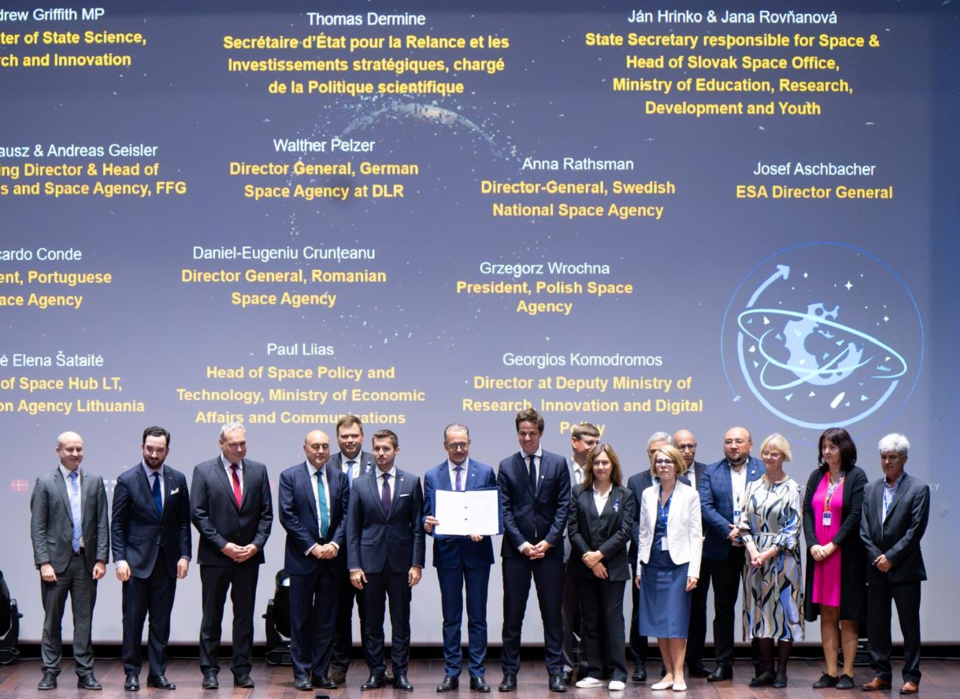12 Countries Signed Zero Debris Charter: A Pivot to Space Sustainability
In a significant step towards ensuring the sustainability of space exploration, 12 countries have recently signed the Zero Debris Charter. This charter aims to address the growing concern of space debris and its potential hazards to satellites and space missions. The signing of this charter marks a crucial milestone in international efforts to mitigate space debris and promote responsible space exploration.

Why this News is Important:
The Urgency of Space Sustainability:
With the increasing number of satellites and space missions, the issue of space debris has become a pressing concern. The accumulation of debris poses a significant risk to operational satellites and future space missions, making the need for sustainable practices in space exploration imperative.
International Cooperation:
The signing of the Zero Debris Charter by 12 countries demonstrates the importance of international cooperation in addressing global challenges. By coming together to tackle the issue of space debris, these countries are setting a precedent for collaborative efforts in space governance and environmental stewardship.
Preservation of Space Environment:
Space is a shared resource that must be preserved for future generations. The Zero Debris Charter represents a commitment to preserving the space environment and ensuring the long-term sustainability of space exploration activities. By adopting measures to mitigate space debris, countries can minimize the risk of collisions and protect critical space assets.
Promotion of Responsible Space Practices:
The Zero Debris Charter not only addresses the cleanup of existing space debris but also emphasizes the importance of preventing future debris generation. By promoting responsible space practices, such as satellite disposal and spacecraft design, the charter aims to minimize the creation of new debris and promote a sustainable approach to space exploration.
Global Implications:
The signing of the Zero Debris Charter has global implications for the future of space exploration and satellite operations. By adopting common guidelines and standards for space debris mitigation, countries can ensure the safe and sustainable use of outer space for scientific, commercial, and national security purposes.
Historical Context:
The issue of space debris has been a growing concern since the early days of space exploration. As more countries and private companies launch satellites and conduct space missions, the risk of collisions with debris from defunct satellites, spent rocket stages, and other objects in orbit has increased significantly.
The proliferation of space debris poses a threat to operational satellites, spacecraft, and astronauts, as even small fragments traveling at high speeds can cause serious damage upon impact. In recent years, there have been several incidents of satellites being damaged or destroyed by debris, highlighting the need for concerted action to address this issue.
The concept of space sustainability has gained traction in recent years, with international organizations such as the United Nations Office for Outer Space Affairs (UNOOSA) and the Inter-Agency Space Debris Coordination Committee (IADC) working to develop guidelines and best practices for space debris mitigation.
The signing of the Zero Debris Charter builds on these efforts and represents a significant step forward in international cooperation on space sustainability. By committing to the principles outlined in the charter, countries are taking concrete action to protect the space environment and ensure the continued viability of space exploration.
5 Key Takeaways from “Zero Debris Charter: A Pivot to Space Sustainability”
| Serial Number | Key Takeaway |
|---|---|
| 1. | The Zero Debris Charter aims to address the growing concern of space debris and promote responsible space exploration. |
| 2. | 12 countries have signed the charter, demonstrating international cooperation in tackling the issue of space debris. |
| 3. | The charter emphasizes the importance of preserving the space environment and promoting sustainable space practices. |
| 4. | By adopting common guidelines for space debris mitigation, countries can minimize the risk of collisions and protect critical space assets. |
| 5. | The signing of the charter has global implications for the future of space exploration and satellite operations. |
Important FAQs for Students from this News
1. What is the Zero Debris Charter?
The Zero Debris Charter is an international agreement aimed at addressing the issue of space debris and promoting sustainable space exploration practices. It outlines guidelines and commitments for participating countries to mitigate the generation of space debris and clean up existing debris.
2. Why is space debris a concern?
Space debris poses a significant threat to operational satellites, spacecraft, and astronauts in orbit. Even small fragments of debris traveling at high speeds can cause serious damage upon impact. The accumulation of debris also increases the risk of collisions, which can create more debris in a cascading effect known as the Kessler syndrome.
3. Which countries have signed the Zero Debris Charter?
As per the latest news, 12 countries have signed the Zero Debris Charter. However, it’s essential to stay updated on any additional signatories or developments related to the charter.
4. How does the Zero Debris Charter promote space sustainability?
The Zero Debris Charter promotes space sustainability by encouraging responsible space practices, such as satellite disposal and spacecraft design, to minimize the generation of new debris. It also emphasizes the importance of cleaning up existing debris to mitigate the risk of collisions and protect critical space assets.
5. What are the implications of the Zero Debris Charter?
The signing of the Zero Debris Charter has global implications for the future of space exploration and satellite operations. It demonstrates international cooperation in addressing a pressing issue and sets a precedent for collaborative efforts in space governance and environmental stewardship.
Some Important Current Affairs Links













